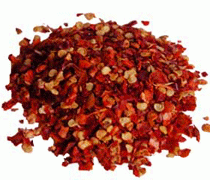
Fructus piperia
Red-Chillies
| Botanical Name | Capsicum annum, Fam. Solanacea |
| Sensoric quality |
Bitter pungent taste |
| Main constituents: | Flavonoid Glycosides |
| Availability: |
|
| Season: | Available all the Year |
| Packing: |
|
Health benefits of Chili
Health benefits of cayenne peppers
Health benefits of cayenne peppers
Although inherently hot and intolerable even in small amounts, cayennes are one of the health-benefiting spice items concentrated with minerals, vitamins and certain phyto-nutrients. It is no wonder this wonderful spice has been found a place in modern as well as in traditional medicines for its disease preventing and health promoting properties.
Cayenne contains health benefiting an alkaloid compound capsaicin, which gives strong spicy pungent character. Early laboratory studies on experimental mammals suggest that capsaicin has anti-bacterial, anti-carcinogenic, analgesic and anti-diabetic properties. When used judiciously it also found to reduce triglycerides and LDL cholesterol levels in obese individuals.
Fresh cayenne peppers, red or green, are rich source of vitamin-C. 100 g fresh chilies provide about76.4 mg or about 127% of RDA. Vitamin-C is a potent water soluble antioxidant. It is required for the collagen synthesis in the body. Collagen is the main structural protein in the body required for maintaining the integrity of blood vessels, skin, organs, and bones. Regular consumption of foods rich in vitamin C helps the body protect from scurvy; develop resistance against infectious agents (boosts immunity) and scavenge harmful, pro-inflammatory free radicals from the body.
Cayenne chili peppers are perhaps the richest source of vitamin A among spice. Just 100 g of cayenne has 41,610 IU or astoundingly 1387% of vitamin A. In addition, this prized spice is also home for anti-oxidant flavonoids such as carotenes, lutein, zea xanthin and cryptoxanthin. Together, these antioxidants in capsicum help to protect the body from injurious effects of free radicals generated during stress, and disease conditions.
The spice contains very high levels of essential minerals. The spice if even consumed in small quantities regularly would provide sufficient levels of iron, copper, zinc, potassium, manganese, magnesium and selenium. Manganese is used by the body as a co-factor for the antioxidant enzyme, superoxide dismutase. Selenium is an anti-oxidant trace element required by the human body for smooth heart and liver functions.
100 g of cayenne peppers provides 2014 mg or 47% of a daily-required amount of potassium. Potassium is an important electrolyte in the cells and body fluids that helps controlling heart rate and blood pressure. It thus counters the bad effects of sodium.
Cayenne peppers are also good in B-complex group of vitamins such as niacin, pyridoxine (vitamin B-6), riboflavin and thiamin (vitamin B-1). These vitamins are essential in the sense that body requires them from external sources to replenish. B-complex vitamins facilitate cellular metabolism through various enzymatic functions.
Cayenne peppers have amazingly very high levels of vitamins and minerals. Just 100 g provides (in % of Recommended daily allowance):
127% of vitamin-C (Ascorbic acid),
39% of vitamin B-6 (Pyridoxine),
54% of niacin,
71% of riboflavin,
1387% of vitamin A,
97.5% of iron,
41% of copper,
43% of potassium,
but no cholesterol.




